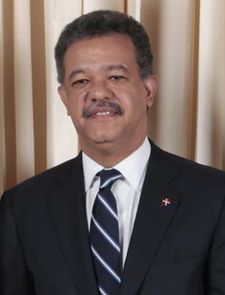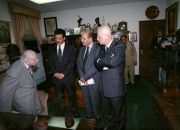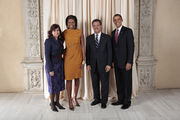Leonel Fernández
| His Excellency Leonel Fernández |
|
 |
|
|
|
|
|---|---|
| Incumbent | |
| Assumed office 16 August 2004 |
|
| Vice President | Rafael Alburquerque |
| Preceded by | Hipólito Mejía |
| In office 16 August 1996 – 16 August 2000 |
|
| Vice President | Jaime David Fernández Mirabal |
| Preceded by | Joaquín Balaguer |
| Succeeded by | Hipólito Mejía |
|
|
|
| Born | 26 December 1953 Santo Domingo, Dominican Republic |
| Political party | |
| Spouse(s) | Margarita Cedeño de Fernández |
| Occupation | Lawyer |
| Religion | Roman Catholicism |
| Signature |  |
Leonel Antonio Fernández Reyna (born 26 December 1953) is a Dominican lawyer, academic, and the current President of the Dominican Republic, since 2004. He held the same office between 1996 and 2000.
Fernández has served as president thrice, becoming the first head of state of the Dominican Republic from his political party, the Dominican Liberation Party (Partido de la Liberación Dominicana [PLD]), whose leader he is. Fernández is serving his second consecutive term in office, after his re-election in 2008. His new four-year term ends in 2012.
He is a native of the Dominican capital, Santo Domingo, and lived for much of his childhood in New York City.
His administrations have focused much on technological development, and are criticized for insufficient focus on social issues. There has been a great deal of criticism about government corruption during his tenures.
Contents |
Early life and beginning of political career
He was born in Santo Domingo, the capital of the Dominican Republic, on December 26, 1953 as the son of Mr. José Antonio Fernández Collado and Mrs. Yolanda Reyna Romero. The family moved to the United States and Leonel spent his childhood and formative years in Washington Heights, New York City.
After he finished high school, he returned to his country and started Law Studies in the Universidad Autonoma de Santo Domingo (UASD). There he joined the Dominican Liberation Party (PLD) at its inception in 1973, when former Dominican President Juan Bosch left the Dominican Revolutionary Party (PRD) to create the new party. Fernández was a close pupil of Bosch, and was presented as a vice-presidential candidate with the latter during the 1994 presidential election.
First presidential term (1996–2000)

A special election was slated for May 1996 after the 1994 presidential election had been widely criticized as a fraudulent and corrupt circus led by incumbent President Joaquín Balaguer of the Reformist Social Christian Party (PRSC).
In the first-round election on 16 May 1996 Fernández received 38.9% of the vote in a three-way race, placing second behind José Francisco Peña Gómez of the Dominican Revolutionary Party (PRD). Neither candidate having obtained a majority (50% plus one), a second round was required, per the Constitution, between Peña Gómez and Fernández. For the second round on 30 June, the PLD and PRSC became allies, and Fernández thus secured 51.2% of the votes to win the election. He was sworn in as President on 16 August, succeeding Balaguer.
During his term in office, Fernández's political agenda was one of economic and critical reform. He helped enhance Dominican participation in hemispheric forums, such as the Organization of American States and the Summit of the Americas (Miami Summit). The Dominican economy enjoyed an average growth rate of seven percent, the highest in Latin America in that period, along with countries like South Korea. Inflation was stabilized in the low single digits, the lowest in all of Latin America.
Fernández also began a very personal and visionary plan to run the Dominican Republic. When developers proposed the country's first modern port during his first term, he said that "We can be the Singapore of the Caribbean".[1]
In Santo Domingo, he built highways and tunnels and favored foreign investment, but delayed fundamental social reforms, like education and public health.
Fernández was unable to run for a consecutive term, as the constitution did not allow it, and thus, his party chose his right-hand man, Danilo Medina, as its candidate for the 2000 election. However, Medina was defeated by a charismatic populist PRD leader, Hipólito Mejía, who captured the popular sentiment at the time, as many Dominicans felt that the Fernández reforms had not improved their lives greatly, and questioned claims of unprecedented economic growth.
Second presidential term (2004–2008)

Fernández was elected to a second term of office in the presidential election held on 16 May 2004 with an absolute majority and the second highest percentage ever in Dominican history (57%). He was sworn in on 16 August 2004. His victory was due in large part to the collapse of the Dominican economy. This collapse has been attributed to skyrocketing oil prices and a slumping international economy post-9/11, excessive borrowing under the Mejía administration and the failure of three of the biggest banks in the country: Banco Intercontinental (Baninter), Bancrédito and Banco Mercantil. In an effort to avoid further economic chaos, the Mejía administration effectively underwrote all three banks, repaying their customers but generating even greater public debt. Some of the bankers involved have been or are on trial, yet the extent of their fraud is hard to measure as their widespread largess with officials within both the Fernández and Mejía administrations has made it nearly impossible to achieve a true accounting of what conditions led to the banks's demise.
Fernández is seen by many Dominicans as a forward and innovative thinker, yet he is considered very traditional regarding social investment. According to local sociologist José Oviedo, "The country trusts him with the economy, but he does not seem to pay that much attention to social issues." Economic prosperity, which his government boasts of, doesn't seem to reach enough people.[1]
Many argue that his tight focus on technological development is often at the expense of basic needs such as food, health, and education and judicial reforms. Perhaps Fernández's biggest issue during both terms in office is his inability to resolve the country's chronic energy problems, as well as his unwillingness to contend with governmental clientelism and corruption. His position as legal counsel for the failed Banco Intercontinental during its spectacular collapse suggests his possible participation in the bank's alleged government influence peddling.
Presidential Elections 2008
During the Mejía administration, the constitution was changed to again allow the immediate re-election of presidents. Although Mejía was ultimately unsuccessful in his bid for re-election, this opened the door for Fernández to attempt a similar run. On 7 May 2007, despite great controversy over whether the PLD party should support the concept of re-election, Fernández won the PLD primary election with a 72% voting percentage against his former Chief of Staff and confidant, Danilo Medina.
As a result, Fernández became the official PLD candidate for the presidency in the May 2008 General Election.
Fernández was declared the victor of the 2008 election, defeating six others, including the PRD candidate and former president Mejía's right-hand man, Miguel Vargas, and the PRSC's candidate, Amable Aristy. Fernández defeated Vargas 53% to 40%, while the third big-party candidate, Aristy, got only around 4%.[2] Vargas accepted the defeat the same day, 16 May, at around 11:30pm.[3] Fernández was sworn in for his third term on 16 August 2008, with the traditional ceremony at the National Congress.[4]
Criticisms and corruption allegations
Since his first presidential term Fernandez's government has been accused of widespread corruption, more notably but not limited to the final months of his first term, from 1996 to 2000. These allegations were acted upon as charges of contract kickbacks, embezzlement, and exorbitant pensions to outgoing officials of his administration were raised by the succeeding government. Although these were ultimately dismissed, the awareness level of the public was raised as to the possible corruption occurring in Fernández's administration.[5]
Increased corruption allegations have continued since his return to power in 2004 and subsequent reelection in 2008. These have led in several instances to media reports and investigations that have exposed illegal activities by high ranking officials within his government, and a public outcry for more action to be taken to control corruption. Many of the government officials that are exposed in the media are not removed from the administration or prosecuted, but moved to other positions of power different from the ones in which they are being exposed.[6]
Awards, honours, and memberships
- Collar of the Order of Merit of Duarte, Sanchez and Mella
- Collar of the Order of Christopher Columbus
- Membership in the Club of Madrid[7]
President Fernández has received the degree of Doctor Honoris Causa from the following institutions:
- University of Paris 1 or La Sorbonne – 1999
- Harvard University – 1999
- Universidad Nacional Pedro Henríquez Ureňa – 2000
- Seton Hall – 2000
- Universidad de Santiago de Chile – 2002
- Lehman College – 2002
- Stevens Institute of Technology, New Jersey – 2004
- University of Massachusetts – 2005
- Hankuk University of Foreign Studies, South Korea – 2006
- Chinese Culture University, Taiwan – 2006
- Institute of High studies of Defense of the Dominican Air Forces – 2009
See also
- Politics of the Dominican Republic
References
- ↑ 1.0 1.1 Tropical Paradox, by Ken Stier. Time.com
- ↑ Reuters. "Election propels Dominican president to third term". http://www.reuters.com/article/idUSN1638429020080517. Retrieved 2010-09-29.
- ↑ Diario Libre. "Miguel Vargas reconoce su derrota" (in Spanish). http://www3.diariolibre.com/noticias_det.php?id=16650. Retrieved 2010-09-29.
- ↑ "Dominican president sworn in for third term", Xinhua (People's Daily Online), 17 August 2008.
- ↑ "DOMINICAN REPUBLIC: FORMER PRESIDENT LEONEL FERNANDEZ IMPLICATED IN CORRUPTION CASE BUT NOT CHARGED". (The Free Library)
- ↑ "Dominican media demands Fernandez act on “pathologically corrupt” official", (Dominican Today), 21 June 2010.
- ↑ (English) The Club of Madrid is an independent organization dedicated to strengthening democracy around the world by drawing on the unique experience and resources of its Members – 66 democratic former heads of state and government.
External links
- Dominican Republic Presidency's official website
- Biography by CIDOB Foundation (in Spanish)
- Biography (in English)
- Biography (in French)
| Political offices | ||
|---|---|---|
| Preceded by Joaquín Balaguer |
President of the Dominican Republic 1996–2000 |
Succeeded by Hipolito Mejía |
| Preceded by Hipólito Mejía |
President of the Dominican Republic 2004–present |
Incumbent |